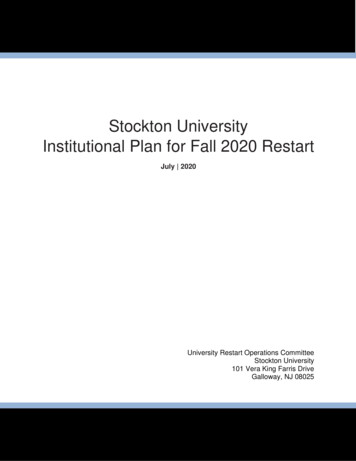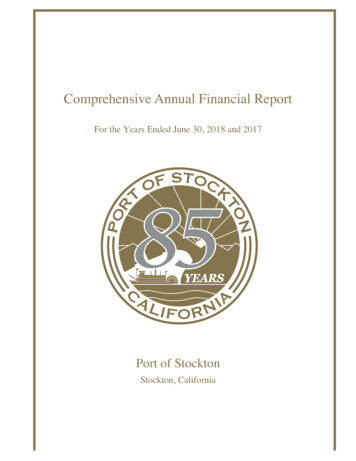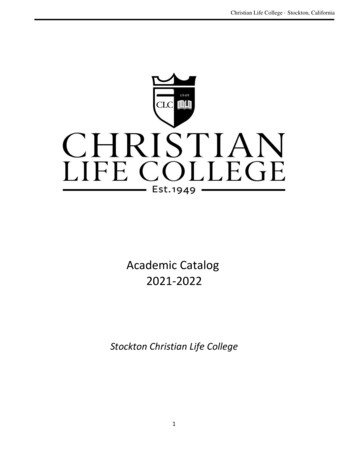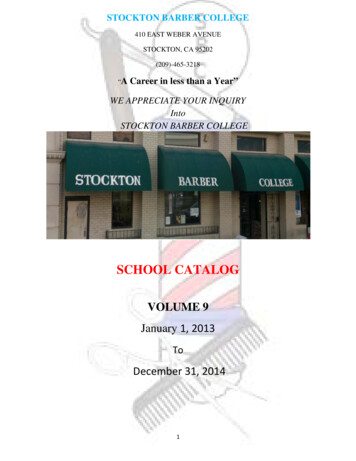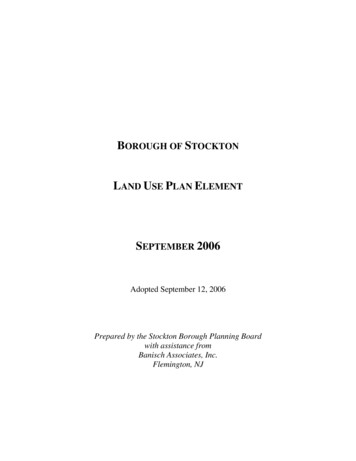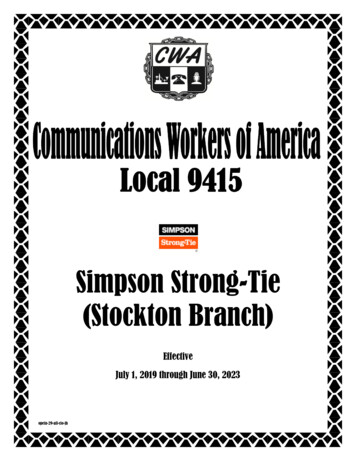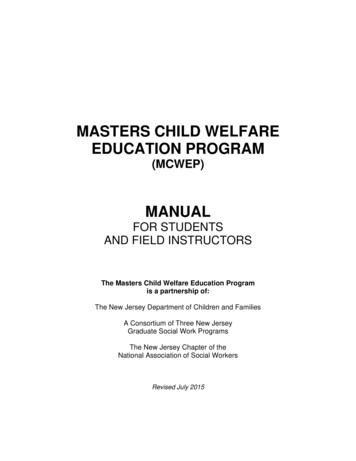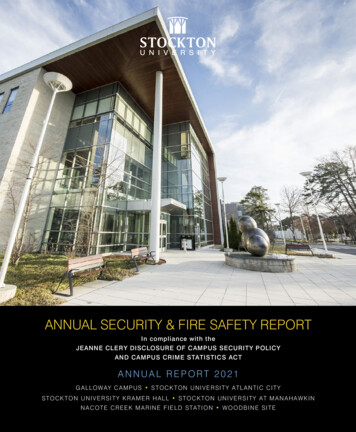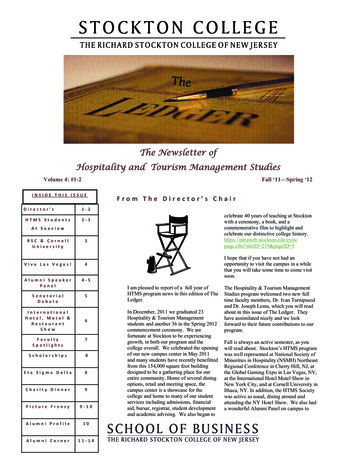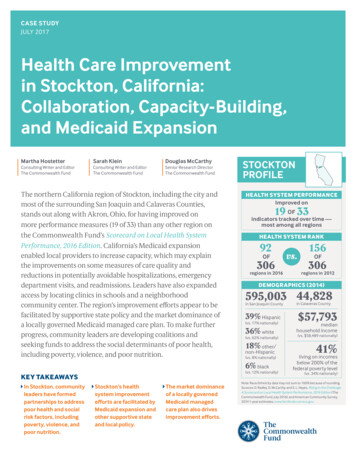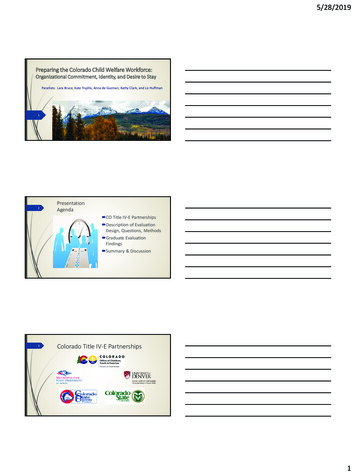
Transcription
5/28/2019Preparing the Colorado Child Welfare Workforce:Organizational Commitment, Identity, and Desire to StayPanelists: Lara Bruce, Kate Trujillo, Anna de Guzman, Kathy Clark, and Liz Huffman12PresentationAgenda CO Title IV-E Partnerships Description of EvaluationDesign, Questions, Methods Graduate EvaluationFindings Summary & Discussion3Colorado Title IV-E Partnerships1
5/28/20194Stipend Graduates Research Questions1. How do Colorado graduates of the stipend programexperience organizational commitment?2. How does receiving a Title IV-E stipend affect theiridentity as a child welfare professional?3. How does being a Title IV-E graduate affect theirdesire to stay in the field?5Mixed Methods Surveys 1 survey for graduates Focus Groups 4 graduate focus groups: 2 in Denver metro area, Northeastregion, Western region6Graduate SurveyEnd of SurveyDemographics&Stipend HistoryCareer PathJob informationJob PerceptionsClimate &CultureBurnout &TraumaIntent to Stay2
5/28/20197Focus Group Questions Background Information How long have you worked in the field of child welfare? In a Colorado countychild welfare agency specifically? Child Welfare Professional Identity Thinking back, how did being a stipend recipient influence your feelings andperceptions of entering the county child welfare workforce? Organizational Commitment What encouraged you to stay working in a county child welfare agency (or inthe field of child welfare) even after you completed the obligation?89Graduate Evaluation FindingsGraduate Survey ParticipantsGraduated 2006-201463%Age 18-3466%White69%Married or Dom. Partner70%MSW90%Payback period was expected time94%Female96%0%25%50%75%100%3
5/28/201910Time in Child Welfare After Graduation3.97Years49%51%Left Child Welfare becauseof:BurnoutWork EnvironmentOther Personal ReasonsSchoolStill in Child Welfare:65% Caseworkers27% Supervisors8% Other1112Graduates Who Left Child WelfareLeft CWFor:83%4.79Graduatedbefore2015Total YearsWorked inChildWelfare ClinicalPractice Other SocialWork Left SocialWorkGraduates Working in Child n ChildWelfare3.892.07Years inCurrentAgencyYears inCurrentPosition4
5/28/201913Competence to Confidence Differences between newbies and experienced staff “you’ve got an edge over people who are just coming in fresh” “get outside of what I was doing and get something new” Transfer learning to practice Knowing the work environment“14I’m going to graduate and you’re going to pay me the same. AndI’m going to have student loan debt. And then I went on to get myLCSW as well and just knowing that it’s more about like you’reinvesting in yourself. And then the agency gets a benefit becauseyou’re a better practitioner. But you don’t necessarily get anyincentive or any recognition or anything like that. They support youin going through the process but it’s not like you get to a differentpay grade or a title or anything like that. Everybody is just the samein terms of the field. And that’s unfortunate.”— Stipend GraduateFinancial Support of Stipends15County SupportWhile Students Flexibility with schedules &workload for employedstudents Learning opportunitiesAfter Graduation Employment payback is helpfulwhen interviewing Lack of recognition for stipendor MSW Learning supports (e.g.,support groups for interns) Educational fund5
5/28/201916Child Welfare Professional Identity Stipend and internship allowed for commitment but learned the jobslowly before diving in Confident competence – “not willing to give that up” Employed students had to self-advocate for professional growth butfelt strong in their identity as child welfare professionals Improved their practice knowledge CW courses not designed for those with expertise Want more macro learning opportunities in courses and internships17Work EnvironmentSelf-EfficacyJob SatisfactionPeer SupportOrganizational ClimateProf DevelopmentCoping StrategiesTime PressureWorkloadWork-related BurnoutPublic Perception of CWClient-related BurnoutSecondary Trauma18Burnout, Secondary Trauma, &Exposure to urnout68%35%Yelled at, shouted at, sworn atThreatened w/o contact6
5/28/2019“ I think you have to have grit to be inthis job. I would say child welfareisn’t rocket science. It’s harder.”19— Stipend GraduatePeer support, lateral moves, career advancement, and changingcounties mediated burnout and turnover according to graduateswho participated in focus groups.20Variable Correlations withIntent to Stay ProfessionalDevelopment &Prep for Work Job Satisfaction OperationalSupport21Intent to Stay –Agency Self-EfficacyJob Satisfaction OrganizationalClimate SecondaryTraumatic Stress Work-relatedBurnout Client-relatedBurnoutGraduates’ Expected CommitmentCurrent Agency (n 48)Child Welfare (n 46)2%19%8%26%41%12%42%22%19% 1 year7-10 yrs9%1-3 yrsCareer4-6 yrs 1 year7-10 yrs1-3 yrsCareer4-6 yrs7
5/28/201922Students’ Expected CommitmentCurrent Agency (n 48)Child Welfare (n 98)1%4%15%18%29%37%19% 1 year7-10 yrs231-3 yrsCareer33%19%25%4-6 yrs 1 year7-10 yrs1-3 yrsCareer4-6 yrsSummary24State & County Perspectives8
5/28/201925Discussion Questions How can counties (in CO, employers for casework staff)support & encourage degree advancement to helpmaintain workers in child welfare? How can universities and the state (IV-E agent forstipends) help support and grow internships andinternship programs in counties? What are next steps for the committee? Focus of another study?9
Colorado Title IV-EFindings from the 2018StipendStipend Graduates StudyButler Institute for Families University of Denver
AcknowledgmentsThis publication represents a collaborative effort by the Colorado Department of Human Services Division ofChild Welfare; Metropolitan State University of Denver Department of Social Work; and Butler Institute forFamilies at the Graduate School of Social Work, University of Denver.Special thanks to graduates of the Colorado Title IV-E child welfare stipend program. They contributed theirstories and their time to take surveys and to participate in focus group; they also helped contact their peersto forward the word about the study. Also, thank you to Laura Kelch at the Butler Institute for Families forhelping the team in a pinch by organizing and conducting the focus groups.Principal Authors:Butler Institute for Families, University of Denver:Anna de Guzman Anna.deGuzman@du.eduMiriam Estrada Miriam.Estrada@du.eduMetropolitan State University of DenverKate Trujillo, PhD, LCSW ktruji21@msudenver.eduRecommended Citation:Butler Institute for Families. (2018). Colorado Title IV-E Stipend: Findings from the 2018 Stipend GraduatesStudy. Denver: CO: Author.For more information:Please visit the Butler Institute for Families website at www.thebutlerinstitute.orgThe contents of this document are solely the responsibility of the Butler Institute for Families and do notnecessarily represent the official views of the Colorado Department of Human Services.This document may be reproduced in whole or part without restriction as long as the Butler Institute forFamilies is credited for the work. Upon request, the contents of this document will be made available inalternate formats to serve accessibility needs of persons with disabilities.Colorado Title IV-E Stipend: Findings from the 2018 Study Report September 20182
Table of ContentsIntroduction . 4Study Information . 4Research Questions Included:. 5Methods . 5Data Analysis . 6Quantitative Data . 6Qualitative Data . 7Results . 8Participants . 8Stipend Experience . 9Financial Support of Title IV-E Stipends . 10County Support during Program . 12Employment Obligation . 14County Support after Graduation . 15Child Welfare Professional Identity . 16Organizational Environment . 17Organizational Climate. 17Job Satisfaction and Self-Efficacy . 18Work Conditions . 18The Impact of Child Welfare Work . 19Peer Support . 20Organizational Commitment. 21Summary . 25Appendix A: 2018 Graduate Survey Item-Level Means . 28Appendix B: 2018 Graduate Survey Scale-Level Means . 34Appendix C: Focus Group Questions. 35Colorado Title IV-E Stipend: Findings from the 2018 Study Report September 20183
IntroductionThe training provision of Title IV-E of the Social Security Act, created as part of the Child Welfare and AdoptionAssistance Act of 1980 [P.L. 96-272], allowed the use of public funding to support staff professional developmentand the opportunity for current and prospective employees to earn Bachelor of Social Work (BSW) and Master ofSocial Work (MSW) degrees. These public funds support partnerships between state and local child welfareagencies and schools of social work to collaborate in providing specialized child welfare education programs thatprepare a new generation of social workers to pursue a child welfare career path. In Colorado, the ColoradoDepartment of Human Services (CDHS) has partnered with University of Denver Graduate School of Social Work(DU GSSW) and Metropolitan State University of Denver Department of Social Work (MSU Denver) to award TitleIV-E child welfare stipends since 1995 to BSW and MSW students. In 2016, university partners were expanded toinclude Colorado State University at Fort Collins and at Pueblo to educate more BSW and MSW students topursue child welfare careers throughout Colorado.Since 1995, the state of Colorado has awarded over 2,000,000 in Title IV-E child welfare stipends to MSU Denverand DU GSSW social work majors who have completed their child welfare courses. Students must apply througheach university’s social work program and compete to receive the child welfare stipend. The stipend programprovides an opportunity for students to gain knowledge and experience in child welfare practice and to secure atleast an entry-level position with a local department of human/social services. The stipend program is also anopportunity for those already working in child welfare to increase their knowledge and improve their practicewith children and families. Through a competitive application and interview process, select recipients receivestipends in amounts ranging from 5,000– 14,000 to help toward tuition costs for one academic year.For the current study, stipend program coordinators from DU GSSW and MSU Denver gathered information ontheir stipend graduates, including information on when they received stipends, when they graduated, theircurrent contact information, and post-graduation employment information, if known. From fall 2005 throughspring 2017, 245 individuals who received a Title IV-E stipend from the state were identified as participants forthe study. Because 40 individuals received more than one stipend (for both their BSW and MSW degrees), therehave been 285 stipends awarded. Of the stipends awarded, 25% were for BSWs only, 2% for both BSW and MSW,and 73% for MSWs. Of the individual students, 46% graduated from MSU Denver and 54% graduated from DU.Study InformationIn the fall of 2017, the Butler Institute for Families at DU GSSW, in collaboration with MSU Denver,proposed to conduct an evaluation of the impact of the stipend program on student retention in childColorado Title IV-E Stipend: Findings from the 2018 Study Report September 20184
welfare in Colorado by tracking stipend students who graduated in the past 10 years (from 2006 to 2016), bothBSW and MSW graduates, from DU’s and MSU Denver’s social work programs. This was expected to be an initialstudy, tracking stipend graduates’ retention in child welfare. At the end of this initial study, the Butler Instituteplanned to submit a report to include initial findings from this study and opportunities for improvement inprocedures, processes, staff capacity, and training to support the delivery of the stipend program and workforceretention. In addition, the evaluation team would recommend additional foci for future stipend programevaluations.Research Questions Included:1. What does the research and practice literature say about workforce recruitment and retention strategiesand the influence of organizational commitment on the child welfare workforce that informs Colorado’sstipend program?2. How do Colorado graduates of the stipend program experience organizational commitment?3. How does receiving a Title IV-E stipend affect their identity as a child welfare professional? How doesbeing a Title IV-E graduate affect their desire to stay in the field?MethodsThe evaluation included a review of existing research, reports, and other applicable materials, as well ascompiling a database of stipend program graduates from DU GSSW and MSU Denver from the past 10 years andgathering feedback through survey and focus group methodology. Evaluators from the Butler Institute forFamilies collaborated with stipend program coordinators in conducting a literature review and met regularly todiscuss the findings in order to inform a collaborative effort in developing measures for the survey and questionsfor focus groups, and in reaching out to contact stipend graduates. Literature review and measures developmentoccurred from November 2017 to April 2018. The 2018 Colorado Stipend Graduate Survey was finalized in April2018 and administered via Qualtrics software, Version April 2018, Copyright 2018. Table 1 lists the measuresinclude in the survey at the individual, unit, organizational, and community levels.Colorado Title IV-E Stipend: Findings from the 2018 Study Report September 20185
TABLE 1: SURVEY MEASURESIndividual FactorsSelf-EfficacyJob SatisfactionUnit-Level FactorsPeer SupportOrganizational FactorsOrganizational ClimateCommunity-Level FactorsPublic Perceptions ofChild WelfareProfessionalDevelopmentIntent to StaySecondary TraumaBurnoutCoping SkillsTime PressureSocial Work EducationExposure to ViolenceThe evaluation team administered the online survey to 202 stipend graduates out of the 245 for whom e-mailaddresses were available. Other survey outreach methods included posting on social media and asking graduatesto forward to their contact lists. The survey was open from May 1, 2018, to June 30, 2018. A 10 incentive(Amazon e-gift card) was provided to those who completed the survey. Following initial survey administration,several reminder e-mails were sent to encourage participation. All responses were kept confidential byresearchers, and individuals’ identifying information were replaced with ID numbers so as not to link back to thestaff member; responses are only reported in aggregate in this report. Invitations to participate in a focus groupwere e-mailed to the same group in April 2018, with a particular focus on those currently working in childwelfare. Focus groups were conducted in May 2018 (two in the Denver metro area, one in the Northeast region,and one virtually for those in Western counties); after participating in a focus group, participants were e-mailed a 30 incentive (Amazon e-gift card). The full measure, with average scores and standard deviations, as well as asample of the focus group questions, can be found in Appendices A–C.Data AnalysisQUANTITATIVE DATAQuantitative data from the survey were exported to Statistical Package for the Social Sciences (SPSS), where theywere coded and analyzed. Descriptive statistics were run on all data sets and are reported as mean, or average,scores (M) and standard deviations (SD).1 The mean scores for all of the survey items are included in Appendix Awhile means scores for all domains are included in Appendix B and specific results are referred to throughoutthese findings. Unless otherwise noted, the following 5-point scales reported mean scores and standarddeviations throughout the report.1A standard deviation indicates the level of variation in the responses. Higher standard deviationsindicate more variation and lower standard deviations indicate less variation.Colorado Title IV-E Stipend: Findings from the 2018 Study Report September 20186
Frequency ScaleAgreement ScaleSatisfaction Scale1 Almost Never1 Strongly Disagree1 Very Dissatisfied2 Sometimes (about 25% of thetime)2 Disagree2 Dissatisfied3 Neither Agree nor Disagree3 Neither Dissatisfied norSatisfied3 About Half the Time4 Usually (about 75% of thetime)4 Agree5 Strongly Agree4 Satisfied5 Very Satisfied5 Almost AlwaysQUALITATIVE DATAAll focus data files were transcribed, with participant name removed, and exported into ATLAS.ti 8.2.33, aqualitative data-analysis program for coding and analysis. Data were analyzed using evaluative coding2 and initialor open coding.3 This means that coding was designed to answer specific assessment questions while alsoremaining open to ideas that emerged from the data. Evaluators at the Butler Institute for Families and MSUDenver conducted the coding and analyses.2Saldaña, J. (2013). The coding manual for qualitative researchers. Thousand Oaks, CA: Sage.Charmaz, K. (2006). Constructing grounded theory. Thousand Oaks, CA: Sage.Colorado Title IV-E Stipend: Findings from the 2018 Study Report September 201873
ResultsThe following section presents findings from the 2018 Colorado Stipend Graduate Survey and focus groups. Whilethe study was limited at first for graduates from 2006-2016, participants who graduated in 2017 were acceptedand included in the results. Results are reported in aggregate and quotations are de-identified for the protectionof participants. This study, including protocols and measures, was approved by the Institutional Review Board(IRB) of University of Denver.ParticipantsIn total, 97 stipend graduates partially or fully completed a survey (40% response rate) and 18 participated in afocus group. Of the survey participants, 90% had received a stipend for their MSW, 8% for their BSW, and 2% forboth; in addition, 68% had graduated from DU GSSW and 28% from MSU Denver (4% from both universities).Demographics of the survey respondents indicated that 66% were between the ages of 18 and 34, 96% werefemale, and 70% were married or had a domestic partner (see Figure 1 for more demographic data).FIGURE 1: STIPEND GRADUATES’ DEMOGRAPHICS (N 97)PARTICIPANT DEMOGRAPHICSGraduated 2006-201463%Payback period was expected time94%MSW90%Married or Dom. Partner70%White69%Female96%Age 18-3466%0%25%50%Colorado Title IV-E Stipend: Findings from the 2018 Study Report September 201875%100%8
Stipend ExperienceGraduates had high praise for their educational programs when they were receiving their stipends, especially fortheir internship experience at county child welfare agencies, and felt strongly that their social work educationprepared them for their current job (see Figure 2). Survey respondents indicated high ratings of agreement withthe Social Work Education scale (M(52) 4.11, SD 0.49). Higher-rated items in the scale indicated that themajority of graduates agreed that their field experience was relevant to their work (M(52) 4.33, SD 0.76) andthat their current position allowed them to use their social work knowledge and skills (M(52) 4.33, SD 0.65).There was not a significant difference between MSU Denver and DU GSSW graduates in their level of satisfactionand perceived usefulness of their social work education.FIGURE 2: PERCENT AGREED ON ITEM: “MY SOCIAL WORK PROGRAM PREPARED ME FOR MY CURRENT POSITION”MSU Denver GraduatesDU GSSW Graduates81%70%AgreedDisagreedAgreedColorado Title IV-E Stipend: Findings from the 2018 Study Report September 2018Disagreed9
Focus group participants agreed that their internship experience prepared them for child welfare work; onegraduate said, “I feel like if you’ve done an internship and then you get hired I feel like you’vegot an edge over people who are just coming in fresh.” For those who were already working in childwelfare, getting the opportunity to learn a different area of child welfare was also helpful, “it was superimportant to me to get outside of what I was doing and get something new. So I was veryintentional about my internship.” Another graduate mentioned that doing their internship in a differentarea broadened their understanding of their agency and that it allowed for opportunities to collaborate andnetwork with different teams. However, they also acknowledged that others had different experiences in theirinternship, due to not receiving the preferred internship (and therefore the learning experiences) they had hopedfor and to a lack of a supportive supervisor.Stipend graduates shared that their internship experiences led to better practice with children and families aswell as improved knowledge of agency culture and environment. One graduate spoke about how learning about“theories and the history . . . made such a difference in my practice” while another one said thatgetting their MSW and doing their internship opened up “a different way of seeing the world and itdefinitely, as you said, impacted my practice immediately.” For graduates who were new to childwelfare, they felt that their experiences in being selected and going through the internship gave them a “softentrance” to the agency where “you’re figuring out the agency, who are the people, who is inleadership, who are the supervisors, who are the workers. So it’s just even getting yourbearings on the organization like how does the organization operate, let alone the job.”Another benefit to their experiences was that they felt more confident in interviewing for jobs because they hadgained experience through their internship, training through the Intern Academy (similar to job trainingrequirement for all new Colorado caseworkers) for more recent graduates, and proven commitment because ofthe employment obligation.Students participating in the focus group also identified areas for improvement in their MSW and BSW programs.Namely, graduates would have liked the option to take classes outside of child welfare–specific course work(particularly for advanced standing students). Graduates also wanted more of a voice in determining theirinternship placement and areas of particular focus. Particularly for graduates who were already working in thefield, reconfiguring the internship to provide opportunities for learning outside of their focus area would be ofgreat value. As one stipend graduate explained, “I am forever grateful for that experience. But, yeah itfelt a little silly to have worked for six years, do an internship at my place of employmentwhere then I was, also, still working.”FINANCIAL SUPPORT OF TITLE IV-E STIPENDSThe Colorado Title IV-E child welfare stipends offset some of the tuition costs for students, but did notcover the full cost of tuition, especially at the University of Denver, a private university. GraduatesColorado Title IV-E Stipend: Findings from the 2018 Study Report September 201810
compared the cost of their degrees and the ways that the stipend program supported the costs. The followingtable offers a comparison of how the stipend program offset tuition costs for the sample of graduates in thisstudy. Graduates noted that the school, their degree program, their tax rate, and whether or not they had to paytaxes on their stipend dramatically affected the amount of personal debt they incurred.TABLE 2: ANNUAL COST OF TUITION AND STIPEND COVERAGE FOR FULL-TIME MSW DEGREE4DUMSU DenverCost of TUITION*(not includingfees or otherexpenses) 47,520(2016–17)Average STIPENDfor urban countyPercent Coveredby StipendTUITION* amountleft to studentTaxes 14,00029% 33,520No 13,656(2017–18) 10,50077% 3,156Yes*In this table, tuition refers to onsite tuition for one year, not including fees or other expenses (the cost for onlineprograms differ).Stipend graduates shared concerns about their investments in the stipend program and their return oninvestment. When discussing student loans, graduates expressed concern about their debt and lack of additionalopportunities for advancement with an MSW. One graduate commented, “so if there’s not anydistinguishment between having your master’s versus just like undergrad we’re taking onthat additional debt because we want to do this. But then what are the benefits for doingthat in this field?” Another graduate noted, “I’ve even advised people don’t get your MSW ifyou’re going to stay in child welfare. If you want to do something else, then get it. But you’regoing to waste your money to get an MSW to work in child welfare. I’m proud that I got itbecause my undergrad wasn’t a BSW. Mine was in criminal justice. So with me, I feel like ithad a purpose. But, yeah, if you’re already in a field don’t go get [it] if you want to stay in thefield.”In general, graduates voiced their frustration about their student debt, but overall acknowledged that pursuingtheir BSW and/or MSW degrees had benefits. One graduate commented, “I’m going to graduate and4The DU GSSW and MSU Denver cost information can be found in the following .pdfColorado Title IV-E Stipend: Findings from the 2018 Study Report September 201811
you’re going to payme the same. AndI’m going to havestudent loan debt.And then I went onto get my LCSW aswell and justknowing that it’smore about likeyou’re investing inyourself. And thenthe agency gets abenefit becauseyou’re a better practitioner. But you don’t necessarily get any incentive or any recognition oranything like that. They support you in going through the process but it’s not like you get to adifferent pay grade or a title or anything like that. Everybody is just the same in terms of thefield. And that’s unfortunate.” However, graduates acknowledged that there were non-financial returns tohaving earned an MSW such as being a part of a professional learning community: “The money was a lot butthe relationships and like the ongoing connection I’ve had to those folks has been reallyvaluable in my career because I’ve been able to do lots of things outside of my position, whichI think has also kind of kept me invigorated.”COUNTY SUPPORT DURING PROGRAMOverall, stipend graduates had high praise for the various ways they felt the counties supported them during theinternships. For those who were already employed, they appreciated the opportunity to work on a flexibleschedule to allow for protected time to fulfill their internship and the ability to fulfill work hours on weekends.Both t
Since 1995, the state of Colorado has awarded over 2,000,000 in Title IV-E child welfare stipends to MSU Denver and DU GSSW social work majors who have completed their child welfare courses. Students must apply through each university's social work program and compete to receive the child welfare stipend. The stipend program
